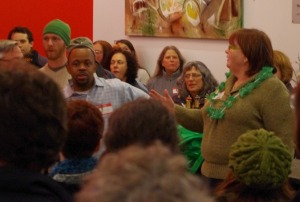By Peter Bardaglio, Senior Fellow, Second Nature
Welcome to the February – March 2012 issue of the TCCPI Newsletter, an electronic update from the Tompkins County Climate Protection Initiative (TCCPI).
Community Coalition Launches Energy Savings Campaign
A coalition of over 70 local organizations officially kicked off the “Get Your GreenBack Tompkins” campaign at a public launch party on February 29 at the Kitchen Theatrein Ithaca, NY. The campaign aims to inspire all 42,000 households and every business in Tompkins County to take at least one new energy and money-saving step in their transportation, energy, waste, and food choices in the next year, saving money, creating jobs, and bringing the county closer to its goal of reducing carbon emissions 80% by 2050.
Since late October, with the help of 600 Cornell students and other community volunteers, the campaign has distributed 12,000 compact florescent light bulbs and information packets that outline ways to save money on energy across four sectors: energy efficiency, transportation, food, and waste. Also included was an application for a home energy assessment worth over $400.
According to Mike Koplinka-Loehr, co-coordinator of the “Get Your GreenBack Tompkins” campaign, the replacement of incandescent bulbs with the 12,000 CFLs would represent a savings of about $589,000 and a reduction in carbon emissions equal to taking 553 cars off the road.
“That’s like making a more than half-million dollar donation directly into the pockets of county residents,” he notes. “If every Tompkins resident takes just one more energy and money saving step, we could all see huge benefits county-wide, building momentum for years to come.”
Over 175 members of the public attended the launch event. Sarah Reistetter-Akiri, co-coordinator with Koplinka-Loehr, said that the launch party gave out more than $2,000 in prizes. Awards were given to Local First Ithaca, the Sustainable Enterprise & Entrepreneur Network, Building Bridges, and the Kitchen Theatre for their innovative community sustainability initiatives. Local businesses provided free refreshments.
The kickoff demonstrates “what’s possible when the entire community sets a goal and works toward it together, involving people from all walks of life,” said Koplinka-Loehr. “We are committed to reaching out to all corners of our community to capture everyone’s imagination in taking new energy savings steps to save dollars and create jobs for neighbors, all throughout 2012.”
Ideas for energy and money-saving steps can be found on the “Get Your GreenBack Tompkins” interactive website. Residents can see there what other people in their community are doing to contribute to the campaign goals.
Any organization or group that would like to get involved during 2012 should contact Sarah Reistetter-Akiri, sr85cu@gmail.com, or Mike Koplinka-Loehr at mak11@cornell.edu, or call the “Get Your GreenBack Tompkins” campaign coalition at 607-272-2292.
Visit www.getyourgreenbacktompkins.org for a list of other upcoming events and be sure to ”like” the GYGB page on Facebook!
K.C. Alvey, TCCPI Intern
New 50 KW Solar Array Powers Up at EcoVillage
EcoVillage at Ithaca, a TCCPI member, recently brought on line a new 50 KW solar panel array, significantly lowering the co-housing community’s carbon footprint. After 18 months of planning and construction, the array will meet 60% of the electricity demand for the 30 homes within EcoVillage’s FRoG neighborhood (First Residents Group), thereby avoiding 250 tons of carbon dioxide per year. Smart metering allows residents to monitor daily energy use and track usage over time, helping them to conserve energy.
The $275,000 PV installation and smart metering system were financed by interest-bearing loans from residents and will be paid off through regular monthly charges for electricity. With the help of tax incentives and a rebate from New York State Energy Research and Development Authority (NYSERDA), the system cost only $88,000.
Residents pay the same or less than they would have on their utility bill, but now much of the money stays in the local community. The cost of the system will be recovered in 12-15 years, at which point “our neighborhood cooperative will own the system outright,” says Liz Walker, executive director of EcoVillage.
The second largest PV system in Tompkins County, its construction created four full-time and four part-time jobs. The project faced some unexpected challenges, including bad weather. Hurricane Irene and Tropical Storm Lee hit after construction began last fall, making the ground too muddy for pouring concrete needed to anchor the system and delaying completion for three months.
“This project is a great example of what a small group of motivated people can accomplish together to live more lightly on the planet,” observes Walker. “The beauty of this example is that it shows that with enough hard work and creative thinking, renewable energy can become accessible to many more people without breaking the household budget.”
K.C. Alvey, TCCPI Intern
One Last Thing
The day after attending the anti-fracking concert in Binghamton featuring Natalie Merchant and the Horse Flies, I ran across a new report published by the American Meteorological concluding that the ice covering Lake Ontario in the winter had decreased by 88 per cent over the last forty years. Eighty-eight percent. That’s a big number. Yes, smaller cyclical climate patterns like El Nino and El Nina were responsible for some of this decline but so, too, was the broad trend of global warming. Lake Superior was so free of ice this past winter that a local ferry north of Ashland, Wis., operated all season, something that has happened only once before.
One of the speakers at the concert called on the audience to not only oppose Marcellus drilling but also to support the development of renewable energy. “Energy efficiency, too,” I thought to myself. Solar, wind, and geothermal by themselves will not be enough to manage the risk of runaway climate change. And climate adaptation and resilience must be tackled, given the amount of change already baked in. And then there are issues of local food security, alternative transportation, and waste, all being addressed in the “Get Your Green Back Tompkins” campaign.
So much work to do; it can all seem more than a little overwhelming. But then every generation has work to do. In many ways, we are fortunate that whatThomas Berry calls “the Great Work” of our time is so well defined. We know what we must do to make sure the generations after us have clean water, clean air, healthy food to eat, and families that thrive. As Natalie Merchant sang that wonderful evening in Binghamton, “These are the days you’ll remember.”



